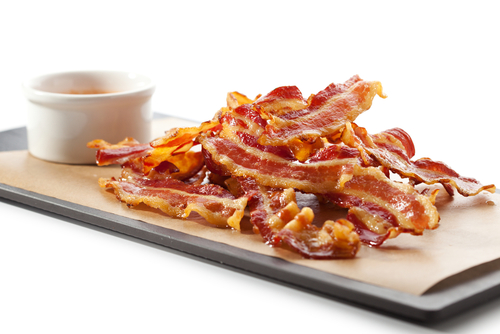Short answer
Bacon is bad for you. Consuming bacon poses undesirable effects to the central nervous system (CNS), coronary system and general well-being of the body.
Recommended Alternative
Long answer
Bacon has sadly become one of the most common food items served in the typical American breakfast. Moreover, bacon is so widely consumed that research suggests that the average person consumes just short of twenty pounds every year. This popular pig meat is not only served at breakfast, but it is consumed for lunch, dinner and it is also used as an additive to give food a bacon flavor for side dishes like green beans.
The entire body of the pig is used in some fashion, though it is not information that the manufacturers like to disclose to the public. Everything from the end of the snout to the tip of the tail is used, and everything in between. Bacon is taken from the abdominal section and is full of fat, hence the fatty white striped appearance that makes many people start to salivate. There are really just three ingredients that keep the bacon-lover hooked: fat, salt and sugar - though the amount of sugar is low. This poisonous threesome is the reason for the euphoric taste.
Overall, pork is not at all healthy for human consumption, as pigs are typically extremely filthy animals. Swine is well-known to have severely septic digestive systems that can transmit dangerous bacteria and viruses into the tissue. Aside from the fact that pigs are grimy creatures, most bacon comes from a pig that has been filled with hormones to promote large litters during breeding and rapid growth rates. Additionally, antibiotics are administered to the pigs in these factories to stop the spread of diseases. No matter how hard we try, bacteria gets into the meat and many consumers become sick as a result. However, you can purchase bacon derived from farm-raised pigs, though it is usually more expensive. Even in the best farming conditions, pig’s meat is not healthy or meant to be consumed.
An alternative to pig bacon is turkey bacon and many people have made the switch. Turkey bacon is marketed as the safe alternative. However, this may contain more nitrates, which are believed to be carcinogenic. Though it is turkey and it is considered to be healthier, this form of turkey meat is extremely processed and contains more saturated fats. Oftentimes, this meat is mechanically separated, which means the animal was put into a grinder and made into a paste-like material. However, just as it is with the pig, you can also buy farm-raised, free-range turkey meat, as long as you are willing to pay more. The turkey taste just might not satisfy, like that of a traditional pig bacon strip.
Bacon’s delicious taste does come at a cost to your health. Sixty-eight percent of its content is fat. It is important to keep in mind that some types of fat are tolerable and even good for you. Saturated fats are good for you in moderation, however, not in the high amounts present in bacon. By eating just four medium slices of pork bacon, you have likely consumed 25% of your daily recommended amount of saturated fat. When consumed excessively, saturated fats are known to cause health problems associated with weight gain and diabetes, as well as heart disease. Bacon also contains mono-saturated fats, known as “the good fats.” These healthy fats are common in olive oil, avocados, and nuts.
In addition to the large fat content, there are nine milligrams of cholesterol in each medium slice of delectable bacon. Cholesterol has been known to cause coronary issues, such as heart attack and stroke.
Bacon is dangerous food, and most people consume well over one or two slices in an average meal. This is one part of the typical human diet that should be completely avoided or limited to special occasions, if possible. The biggest problem associated with bacon is the over indulgence.
Possible short-term side effects
- nausea
- flushing
- dizziness
- increased blood pressure
Possible long-term side effects
- antibiotic immunities
- cancer
- chronic pulmonary disease (cpd)
- diabetes
- diseases (pork)
- elevated cholesterol
- heart disease
- hormonal imbalance
- hypertension
- stroke
Ingredients to be aware of

Healthier alternatives
- non-processed meats
- organic turkey bacon
Our Wellness Pick (what is this?)
No Sugar Added Bacon
- Whole30 Approved
- Nitrate Free
- Keto & Paleo Friendly
- Low Fat & Low Sodium
- Healthier Bacon Choice
 Approved by
Approved by 















